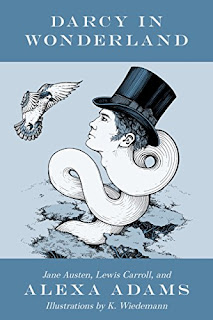 |
| Available on AmazonAmazon |
*****
I’m so happy to visit More Agreeably Engaged to share an
excerpt from my new release, By Reason,
by Reflection, by Everything. A thousand thanks for having me here, Janet.
It’s always a great pleasure.
About the Book
Promised to one sister. Bewitched by the other. And thus,
Mr. Fitzwilliam Darcy’s dilemma. Who else but Miss Elizabeth Bennet might
possibly bewitch Mr. Darcy? This begs the question: to whom is the gentleman promised?
We all know it was the favorite wish of Darcy’s mother, Lady
Anne, as well as her sister, Lady Catherine de Bourgh, that their children were
intended for each other. By Reason. By
Reflection, by Everything poses the question: what if the elder Mr. Darcy
had a favorite wish of his own? What if
his first-born son was promised to Mr. Bennet’s first-born daughter?
Enjoy!
Excerpt
(Reprinted with Author’s Permission. All Rights Reserved.)
Chapter 8 –
Unsisterly-like Sentiments
After walking along for a time, relishing in what felt like
her own private sanctuary, Elizabeth examined her watch. Much to her dismay,
she had walked longer than she had intended. Much longer, she considered
as she spun round on her heels and
proceeded to return to the manor house.
What will the Darcys think of me, should I fail to make
an appearance at breakfast this morning? Exploring the grounds had occupied
her so thoroughly that upon coming to a fork in the wooded path, Elizabeth was
not entirely certain she knew which direction would lead her back to where she
meant to be.
She was just about to strike out on the path to her left
when the sound of horse steps drew her attention. Turning, she espied Mr.
Fitzwilliam Darcy. She knew not whether he was simply out enjoying an early
morning ride or if he had come in search of her. He dismounted. Taking the
horse by its reins in his gloved hand, he stopped a short distance from where
Elizabeth stood and bowed slightly.
“Miss Elizabeth,” said the gentleman, his melodic voice
accompanied by his brooding stare which sent a frisson of anticipation through
her body.
All too aware that these were the first two words he had
uttered to her since making his acquaintance, Elizabeth’s stomach fluttered a
bit. She did not dare admit how the sound of his voice made her quiver inside.
Besides, to whom would she make such a telling confession? Certainly not to
Jane. He was, after all, Jane’s prospective suitor.
“Mr. Darcy,” she said, curtsying. “Pray I have not caused
you to come all this way in search of me.”
“No,” he said.
His taciturn manner in addition to his gaze left her feeling
a bit uneasy.
“I was enjoying a morning walk,” she announced, more eagerly
than she had intended.
“Do you often ramble about during the early morning hours to
parts unknown?” The look he bestowed spoke volumes. “Alone, no less,” he added.
“I am very fond of walking, sir.”
“Indeed.”
Her courage rising in the wake of what she perceived as
chastisement, she responded, “Are you judging me, Mr. Darcy?”
“Judging you? No. Questioning you? Indeed. I would go
further to caution you to be more prudent in your choice of paths—that is until
you are more familiar with Pemberley Woods.”
“I shall take your words under advisement, sir.” And with
that, she abruptly turned on her heels with the intention of returning to the
manor house, preferably alone. It simply would not do to spend too much time
with the gentleman so certain was she that if she were not careful, she might
grow afraid of him. That would never do.
“Where are you going?” Darcy inquired. “If you do not mind
my asking.”
“No, I do not mind your asking, sir. I am returning to the
manor house before my continued absence arouses my family’s concern.”
“Then might I suggest you choose the path to the right, Miss
Elizabeth. I have it on good authority that it leads directly to the manor
house.”
She arched her brow. “Are you laughing at me?”
“I would not dare. In fact, if you will allow me to be of
service, I will be more than happy to escort you.”
“I do not believe that is necessary,” she said. In fact, the
last thing she wanted was to be seen with him.
Heaven forbid if that jealous Miss
Bingley were to begin thinking she had yet another competitor for the
gentleman’s attention.
“If you are concerned about what others will think if the
two of us were to be seen walking together at this hour, then you need not be.
You are perfectly safe with me.”
I suppose that is a matter of opinion, she thought
but did not say.
In response to her silence, he said, “I am more than happy
to offer you my steed. I will walk.”
“Oh! Heaven forbid,
sir. Even if I were inclined to ride your horse, which I absolutely am not, I
would never dream of inconveniencing you in such a manner.”
“Trust me, it is no inconvenience at all. Allow me to assist
you,” Mr. Darcy offered.
If Elizabeth did not know better, she would have sworn the
gentleman was flirting with her. How in the world did he expect to assist her
in any way that would not result in more familiarity than ought to be allowed between two people so wholly unconnected as the
two of them?
“Sir, you are very kind,” she said coolly. “However, as I
said, I am not inclined to ride horseback.” Wanting to offer him a reasonable
explanation, she went on to say, “You see, Mr. Darcy, I am not a horsewoman.
Indeed, I never learned to ride.”
Darcy laughed a little at this confession. His spirits
rising to playfulness, he threw a furtive glance over his shoulder as if
looking to see if anyone was about. “Pray do not let my aunt Lady Catherine
hear you say such a thing. You know how concerned she is about your having no
governess.”
Elizabeth laughed a little too in recollection of her
ladyship’s outrage. “Indeed. But you need not worry that all the Bennet
daughters have been remiss in that regard. My sister Jane is an excellent
horsewoman, as I am certain you will discover over the coming days and weeks.”
His manner suddenly cool and grave, he said, “No doubt.”
Just as quickly, he resumed his former attitude just a bit. “Still there is the
matter of your expeditious return to the manor house. I really would be honored
if you would allow me to accompany you. There is much I would enjoy discussing
with you.”
“About my sister Jane,” Elizabeth said with some enthusiasm.
Darcy nodded a little. “Indeed.”
Disguise of any sort
was Darcy’s abhorrence. The secret that he was keeping from everyone, even his
closest friend the colonel, about his father’s ailing health and the fact that
he was pretending to give some consideration to marriage caused him no small
measure of discomfort. He took some comfort in the fact that he was not
entirely dishonest in urging his companion to allow him to accompany her back
to the manor house. If discussing her elder sister was the means of
accomplishing his goal of spending time with Miss Elizabeth, then far be it
from him to do otherwise. What better way to satisfy his own increasing
curiosity about her.
“You mentioned that your sister - that Miss Bennet - is an
excellent horsewoman and yet you do not ride horses at all. Why is that, if I
might ask?”
“Unlike me, Jane never witnessed another person being tossed
from a horse and sustaining a debilitating injury.”
The two exchanged looks, hers laced with a semblance of the
pain she suffered at the time and his filled with empathy.
“I am sorry you had to suffer such an unpleasant experience,
Miss Elizabeth.”
“Sir, you are very kind. However, that was many years ago,
and I am only reminded of it when in proximity to one of those fierce
creatures.” Here she glanced over her shoulder. She bit her lower lip.
Seeing this, Darcy ceased his step and approached his horse.
He whispered in the beast’s ear and then secured the reins to its saddle.
Seconds later, the fierce animal was on its way - racing ahead. Alone.
Removing his gloves one by one and then clasping his hands
behind his back, Darcy said, “How is that, Miss Elizabeth?”
Her spirits rising to playfulness, she said, “Again,
sir, you are far too kind to me.”
“As you are my guest, I hope you will find that I am more
than happy to do whatever it takes to be of service to you,” Darcy said. “You
and your sister,” he added, smiling.
If Elizabeth secretly delighted in admiring his brooding mien, seeing him smile really stole her breath
away. Indeed, she had seen him smile a time or two the evening before but not
like this. My sister Jane is a most fortunate woman, she reminded
herself.
Allowing her mind to wander, she wondered what it would be
like if that particular smile of his was
meant for her alone. How fortunate it would be if she were the woman who
garnered his esteem.
No, I must not allow myself to think this way, else it
will be a very long, hot and tumultuous summer, at the end of which this man
might be my brother.
Contact Details
Newsletter: Such
Happy News
Twitter: @podixon
Facebook: http://www.facebook.com/podixon
Pinterest: http://pinterest.com/podixon
Website: http://podixon.com
Buy the Book
Oh, I did enjoy that excerpt! What do you think, Dear Readers? Do you want to know more? I certainly do. If Miss Bingley is at Pemberley, then Charles must be too. I'm wondering about the tangled web that Ms. Dixon may be spinning! Questions, questions, and more questions! One of you lucky readers will get the chance to discover what lies ahead for beloved couple. Yes, that is correct. P. O. Dixon is giving away one eBook of By Reason, by Reflection, by Everything and the giveaway is international. Please have your share in the conversation and tell us what you think. Have you read this book yet? Be sure and leave your contact info. The giveaway will end at 11:59 PM on the 4th of September. Good luck to all.
Thank you for having the giveaway Ms. Dixon, and I do hope you will come back soon.



















